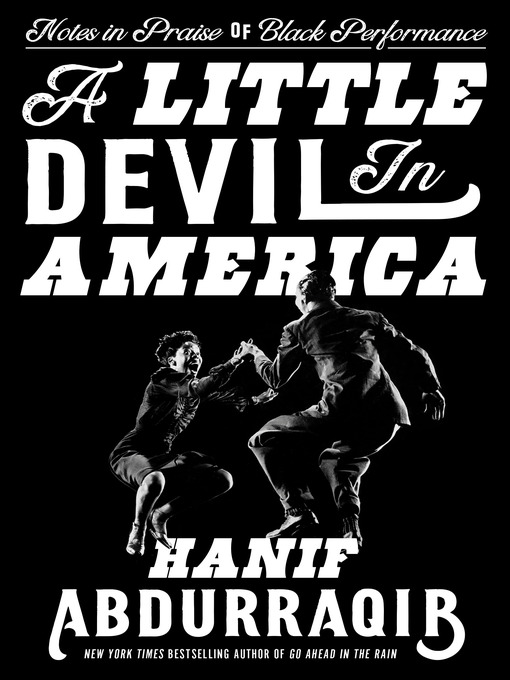
A Little Devil in America
Notes in Praise of Black Performance
- اطلاعات
- نقد و بررسی
- دیدگاه کاربران
نقد و بررسی

Starred review from January 18, 2021
In this staggeringly intimate meditation, essayist and poet Abdurraqib (Go Ahead in the Rain), chronicles Black performance in American culture. Broken into five “movements” consisting of essays, fragments, and prose poems, Abdurraqib weaves cultural analyses with personal stories. “On the Certain and Uncertain Movement of Limbs” captures Whitney Houston’s performance at the 1988 Grammy Awards (“And I will tell you what I know, and what I know is that Whitney Houston could not dance”). In “On Going Home as Performance,” Abdurraqib commemorates Michael Jackson on the night of his death in a club where “there wasn’t enough space for the bodies to do anything except dance.” Abdurraqib shines a light on how Black artists have shaped—and been shaped by—American culture: he outlines Josephine Baker’s life as a performer and a spy, and examines the “magical negro” trope and “the laughter of white people” through performances by Dave Chappelle and magician Ellen Armstrong. Abdurraqib addresses his commentary to readers both alive and dead, referring to “my dearest dancing ancestors,” “magically endowed problem solvers,” the “non-Black reader or scholar of history,” and a “dearly departed band of brothers,” and his prose is reliably razor-sharp. Filled with nuance and lyricism, Abdurraqib’s luminous survey is stunning.

January 15, 2021
A thoughtful memoir rolled into a set of joined essays on life, death, and the Black experience in America. Black women, it's been said, saved American democracy by delivering their votes to the Democratic Party in 2020. Poet, essayist, and music critic Abdurraqib is having none of it. "Black people--specifically Black women in this case, are not here in this country as vessels to drag it closer to some moral competence," he writes. Later, he adds, "it occurred to me that Black women were simply attempting to save themselves." The point is well taken. The chapters open with flowing stream-of-consciousness introductory passages--e.g., "I was the only one in the Islamic Center on Broad Street who got to stay up & watch the shows on MTV that came on after my parents cut out the lights & went up to bed & it was only me & the warmth of an old television's glow & the DJs spinning C+C Music Factory for people in baggy & colorful getups"--and then settle in to tightly constructed, smart essays--in this case, about the history of marathon dancing, the exhilarating contributions but tragic life of Soul Train host Don Cornelius, the deaths of both his mother and Aretha Franklin, and numerous other subjects. In another essay, Abdurraqib considers the concept of the magical negro and the unenviable role of being the Black friend who provides an escape route for White racism. Here, comedian Dave Chappelle figures prominently, having become a huge draw for Comedy Central precisely because it gained a huge White audience: "Chappelle got to be everyone's Black friend for a while," writes the author. "The one that stays at a comfortable enough distance but still provides a service." Social criticism, pop culture, and autobiography come together neatly in these pages, and every sentence is sharp, provocative, and self-aware. Another winner from Abdurraqib, a writer always worth paying attention to.
COPYRIGHT(2021) Kirkus Reviews, ALL RIGHTS RESERVED.

Starred review from February 1, 2021
Poet, essayist, and cultural critic Abdurraqib (Go Ahead in the Rain: Notes to A Tribe Called Quest) studies the impact of Black performers throughout U.S. history, sharing his own poignant stories along the way. Inspired by Josephine Baker's extraordinary life and her self-proclaimed title of "little devil in America," Abdurraqib pens respectful, heartwarming essays that reflect on other giants in music, television, cinema, and even magic. From intense dance marathons to afternoon sock hops, from the funerals of Michael Jackson and Aretha Franklin to games of spades to barroom brawls, he examines the feeling of invisibility that haunts so many Black Americans. He scrutinizes ways in which Black artists subverted racial stereotypes, such as Josephine Baker's banana skirt performance, which tackled the assumption of Black people as primitive and made it "so absurd that it circled around to desire." The author also calls out the use of blackface and the sanitization of race relations in today's films and laments the exploitation of violence against and by African Americans. VERDICT Told with humor and grace, Abdurraqib's stories will inspire and provoke thoughtful meditations on how Black lives matter in all areas of life and art.--Lisa Henry, Kirkwood P.L., MO
Copyright 2021 Library Journal, LLC Used with permission.

March 1, 2021
Blending pop-culture essays, memoir, and poetry, the latest collection by Abdurraqib, following A Fortune for Your Disaster (2019), delves into the many iterations of Black artistic expression through an often deeply personal lens. Divided into five "movements," these pieces offer an expansive exploration of subjects ranging from the often-tragic lives of legendary Black artists to close examination of a singular performance. On Merry Clayton's choruses in the Rolling Stones' song ""Gimme Shelter,"" Abdurraqib writes: "They would speak of her performance, and how it summoned all of the darkness in one hand and all of the light in the other." Whether pondering the dynamic life and contributions of Josephine Baker (to whom the book is dedicated) or meditating on his own various performances, the author's ruminations are an invitation to think deeply about Black performance on both cultural and individual levels. Abdurraqib consistently engages the reader, mixing conversational tones and poetic turns of phrase ("it feels, most days, like my grief is simply being rebuilt and restructured along my own interior landscape"), with surprising, succinct insights ("to know whiteness is an infinite task"). Startling, layered, and timely, this is an essential, illuminating collection that advances Abdurraqib's already impressive body of work.
COPYRIGHT(2021) Booklist, ALL RIGHTS RESERVED.




دیدگاه کاربران